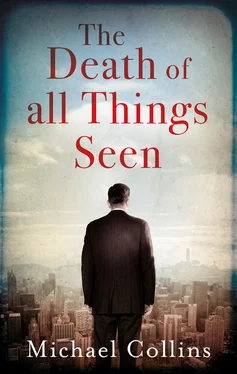On this morning, Norman felt the inherent stirring of a re-energizing intellect. He was wandering into a creative and searching space, the unmoored flotsam of events washing up in the scud of the subconscious. He was building, from what remained, some kind of raft, something that would sustain and carry him forward, liberate and connect him again to his craft. He liked the double meaning of the word craft , how the right words could be carried in a riptide of understanding, a process that required not so much strength as patience to assess and reconfigure life, so one could stare back toward the coastline of the inhabited world, then make for shore once more.
Norman stared at the images of his former life. Neither Helen nor Walter existed anymore. They had been incinerated. Tightness gripped his chest, a register of emotion he was not aware he still possessed.
He pulled up the Internet memorial site to affirm Helen had ever existed. Not a single person had signed her virtual memorial book. A question mark placeholder showed where a picture should have been uploaded and never was. An American flag wavered like a flag plangently planted on the moon, suggesting that the afterlife was somehow the province of an American holding.
And yet, it somehow fit with a certain understanding that Helen had of the American experience — its striving greatness and sense of possibility pursued and then abandoned in the lunar grey of a destination reached and then forgotten — so he understood, the journey had been the point, and not the landing, not the conquest. It was the story of the moon and so much of everything else in life.
Norman was suddenly glad now for the Internet, for the impersonal expediency of how all matters of life and death could now be so negotiated in a disconnectedness of connectedness. All a real funeral would have revealed was that there had been nobody in his mother’s life for a very long time.
Helen had opted for an insignificant departure, a literal dropping off the earth into the depths of the great lake, seeking the fathoms of her own grave, taking with her the argosy of her dreams, the air pocket of her retirement, ending in the literal rising of a water line in the cab of her car. It fit her temperament, the attempted, self-contained death, the tight circle of her own thoughts and ideas, her immense capacity to withhold opinions, to stay in the orbit of her own existence.
For a moment, his thoughts settled once more with the Titanic , on the sullen passing of life in the cold reaches of the North Atlantic far from shore. He hadn’t watched Titanic in a long time.
In the falling snow, he thought, why not seal off the outside world for a lost day of tragic remembrance? Why not submit to this quiet reprieve, rerun history in the wavering stills, the opening sequence draped in the raiment of the dirge of Uilleann pipes against the siren’s lament of Celine Dion?
He was, he felt, the Rose Dewitt of a lesser tragedy, but a tragedy nonetheless. Maybe he could dive as the submersible did, dredge back a history long sunken. Yes, maybe that is what he would do.
TO NATE FELDMAN, Helen Price was always just The Other Woman , so he didn’t immediately recall her name when he first read it in a letter sent to him by a law firm out of Chicago.
*
Nate snaked along a logging road against a pale luminescence of banked snow and out along a rut of iced road. His bladder ached from the grind of the snow-chained tires. He was at the age when the signs of mortality announced themselves. He edged toward the glow of Iroquois Falls, the world encased in a domed dark that in late January held past nine thirty.
A storm was forecast. Nate had the radio tuned to the Canadian weather service. The barometric pressure was dropping fast, but he had errands to run and just this window of opportunity. He didn’t meet a single car on the road. His eyes focused on the funneling cone of his headlights, old growth pines running sentinel along either side of the road. There were times when he felt like the last human alive, as if only he had survived a great cataclysm, which, in a way, he had.
The town was all but deserted, though there were lights on at various establishments. He shuffled through the mail in the cold vestibule of the post office. What struck him first was the airmail blue of the envelope. He felt an overwhelming sense of déjà vu, so he had to lean for support against the burnished patina brass of the PO boxes.
He fingered the waxy weightlessness of the envelope, recalling a time when weight mattered, when the envelope itself was the medium on which one wrote, and when it was done, the letter written, the folding origami, making it an envelope again, the tongue running along the sweet bordering glue.
He felt the stab of memory. His father had sent him letters to this same PO box with the affectation of par avion , letters asking after his health, but more pointedly after Nate’s wife and newborn child, though their names were never mentioned under the presumption that all letters were opened by the United States government.
Back in the pickup, Nate let the vents pour a dry heat over his hands. He ran his thumb along the crinkled give of the envelope. It was upon him, all that he had left behind.
He recalled the first summer of his escape, the encroach of wildfire, the sky a sanguine blood orange, the thunderous stampede of wildlife in a pitiless retreat toward rivers in a natural divide of a fire line, and then the soot and ash, the torrents of rain that darkened the midsummer as though it had all been delivered unto him alone.
He had endured those first months with a moral indecisiveness so it was hard to find the measure of who he was. He braced against the knifing advance of autumnal days he knew would come, and did. Inside his cabin, he had penned letters against the throw of shifting firelight, grappling not with the immediacy of what was happening, but seeking a grander assessment of life, writing with the instinctive understanding that what he set down would be read again and again, not for the hard and fast facts, but as an epistolary of a life lived.
A shudder ran through him. Guilt dogged him. He struggled for the right metaphor. How best to describe it, this past? An old scar in the boggy tenderness of flesh never made quite right; his history an escape that would outlast the conflict in Vietnam, the pull-out from Saigon, the receding proxy of Cold War conflicts fought in far off jungles.
Maybe that was why he had felt such swelling euphoria on first seeing the Twin Towers come down — not for the loss of life. He was philosophically against death, but he aligned with the literal act of aggression. War had come to American shores, so it wouldn’t be a case anymore of shipping young men overseas, for the fight would be fought on American soil. It turned out not to have been the case.
*
Nate didn’t open the letter right away. He was past the insistent pressure of youth. He would wait, though he felt a thumping in his chest as he went about his business. He exited the pickup under the bowl of a streetlight. The wind took the door. The hinges creaked and strained. He pushed the door shut with both hands. A dusting of snow blew around his face. Storm was in the air.
In the warm store, he picked up his supplies: coffee, evaporated milk, an assortment of meats, three bags of flour, rice, beans, a kilo of sugar, an allotment of canned goods. He had emailed his order ahead. The goods were sitting in a crate with his name stapled to the slatted wood. It could have been the nineteenth century.
He checked the contents against his list. The proprietor, Pierre Arouet, came out but neither of them spoke. The store bell trembled on a coil spring. There were highlights of the previous night’s game between the Oilers and Canadiens on a big screen TV in the background. Roars filled the silence. This was how wars were settled, in the contained rink of Canadian ice, the rapacious frack of the gas boom western province pitted against the militant Québécois Francophiles, and yet Canada held.
Читать дальше












